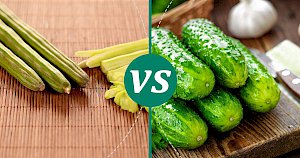Cucumber vs Moringa: Nutrition & Calories Compare


Cucumber vs Moringa
Nutrition Facts
Serving size:
change
5g10g15g20g30g40g50g60g80g100g120g140g160g180g200g220g250g300g350g400g450g500g600g700g800g900g1000g
1oz2oz3oz4oz5oz6oz7oz8oz10oz12oz15oz20oz25oz30oz35oz40oz50oz
Amount Per Serving:
Serving size:
change
5g10g15g20g30g40g50g60g80g100g120g140g160g180g200g220g250g300g350g400g450g500g600g700g800g900g1000g
1oz2oz3oz4oz5oz6oz7oz8oz10oz12oz15oz20oz25oz30oz35oz40oz50oz
Amount Per Serving:
Cucumber vs Moringa 100g Compare
| per 100g | Cucumber | Moringa |
|---|---|---|
| Calories | 15 | 37 |
| Carbohydrates | 3.63 g | 8.53 g |
| Fat | 0.11 g | 0.2 g |
| Dietary fiber | 0.5 g | 3.2 g |
| Protein | 0.65 g | 2.1 g |
| Calcium | 16 mg | 30 mg |
| Iron | 0.28 mg | 0.36 mg |
| Magnessium | 13 mg | 45 mg |
| Potassium | 147 mg | 461 mg |
| Sodium | 2 mg | 42 mg |
| Zink | 0.2 mg | 0.45 mg |
| Vitaminium A | 105 µg | 74 µg |
| Vitaminium B1 (Thiamine) | 0.027 mg | 0.053 mg |
| Vitaminium B2 (riboflavin) | 0.033 mg | 0.074 mg |
| Vitaminium B3 (Niacin) | 0.098 mg | 0.68 mg |
| Vitaminium B6 | 0.04 mg | 0.12 mg |
| Vitaminium B9 (Folic acid) | 7 mg | 44 mg |
| Vitaminium C | 2.8 mg | 141 mg |
Discovering the Nutritional Gems: Cucumber and Moringa
When it comes to enriching our diet with nutritious foods, cucumbers and moringa stand out for their unique health benefits. Both are celebrated for their nutritional content and have been used across various cultures for their medicinal properties. Before we dive into a detailed comparison, let's explore some fascinating facts about these two natural wonders.
Refreshing Facts About Cucumber
Cucumbers are more than 95% water, making them an excellent choice for hydration and cooling the body, especially during hot weather. Originating from India, cucumbers have been cultivated for at least 3,000 years, and they belong to the same plant family as melons and squashes. They are not only low in calories but also contain important vitamins and minerals, including vitamin K, potassium, and magnesium.
Miraculous Moringa: The Drumstick Tree
Moringa, often called the 'Miracle Tree' or 'Drumstick Tree', is native to parts of Africa and Asia. Every part of the moringa tree, including its leaves, seeds, and roots, has been used in traditional medicine for centuries. Moringa leaves are incredibly nutrient-dense, packed with proteins, vitamins, and minerals. It's a powerful antioxidant and has been linked to reduced inflammation and lower blood sugar levels.
Nutritional Face-Off: Cucumber vs. Moringa
When comparing the nutritional profiles of cucumber and moringa, it's clear that both have their unique advantages. Here's a breakdown of their nutritional content per 100g serving:
- Calories: Cucumber is lower in calories (15) compared to moringa (37), making cucumbers a great option for those watching their calorie intake.
- Carbohydrates and Fiber: Moringa has higher carbs (8.53g) and fiber (3.2g) than cucumber (3.63g carbs, 0.5g fiber), which can be beneficial for digestion and blood sugar control.
- Protein: Moringa shines with a higher protein content (2.1g) compared to cucumber (0.65g), making it a valuable plant-based protein source.
- Vitamins and Minerals: Moringa outperforms cucumber in most vitamins and minerals, including vitamin C, magnesium, potassium, and iron, supporting overall health and well-being.
While cucumbers provide hydration and essential nutrients with very low calories, moringa offers a more concentrated source of vitamins, minerals, and protein. Depending on your dietary needs, incorporating both can be a great way to enjoy a variety of nutrients.
Conclusion: A Place for Both in Your Diet
Choosing between cucumber and moringa doesn't have to be an either/or decision. Both offer unique nutritional benefits that can complement a balanced diet. Cucumbers can be enjoyed for their refreshing taste and hydration, while moringa's nutrient-dense profile makes it an excellent addition to boost the nutritional content of meals. By understanding the nutritional offerings of both, you can make informed decisions that cater to your health and dietary preferences.
Cucumber 100g
15kcalCalories source
- 80% CARBS.
- 14% PROTEIN
- 5% FAT
Moringa 100g
37kcalCalories source
- 77% CARBS
- 19% PROTEIN
- 4% FAT
Compares of cucumber
- Cucumber vs Artichoke
- Cucumber vs Arugula
- Cucumber vs Asparagus
- Cucumber vs Beetroot
- Cucumber vs Pepper
- Cucumber vs Bok Choy
- see all compares of cucumber
Marcin Piotrowicz
calories-info.com creator
Healthy diet and healthy lifestyle promoter
Add comment